A Deep Dive into Society, Values, and Class in Pride and Prejudice
VerifiedAdded on 2023/01/23
|8
|3210
|64
Essay
AI Summary
This essay analyzes the portrayal of societal values in Jane Austen's novel, *Pride and Prejudice*, focusing on the influence of class, money, gender, and marriage in early 19th-century England. The essay examines how Austen uses her characters, such as Darcy, Elizabeth, Lady Catherine de Bourgh, and the Gardiners, to illustrate the importance of social standing, proper behavior, and the conflicting values of the time. It explores the expectations of ladies and gentlemen, the impact of wealth, and the consequences of violating social norms, like Lydia Bennet's scandalous behavior. The essay highlights the similarities and differences between the values of Austen's time and modern society, emphasizing how Austen uses satire and character development to critique and offer alternative perspectives on social expectations.
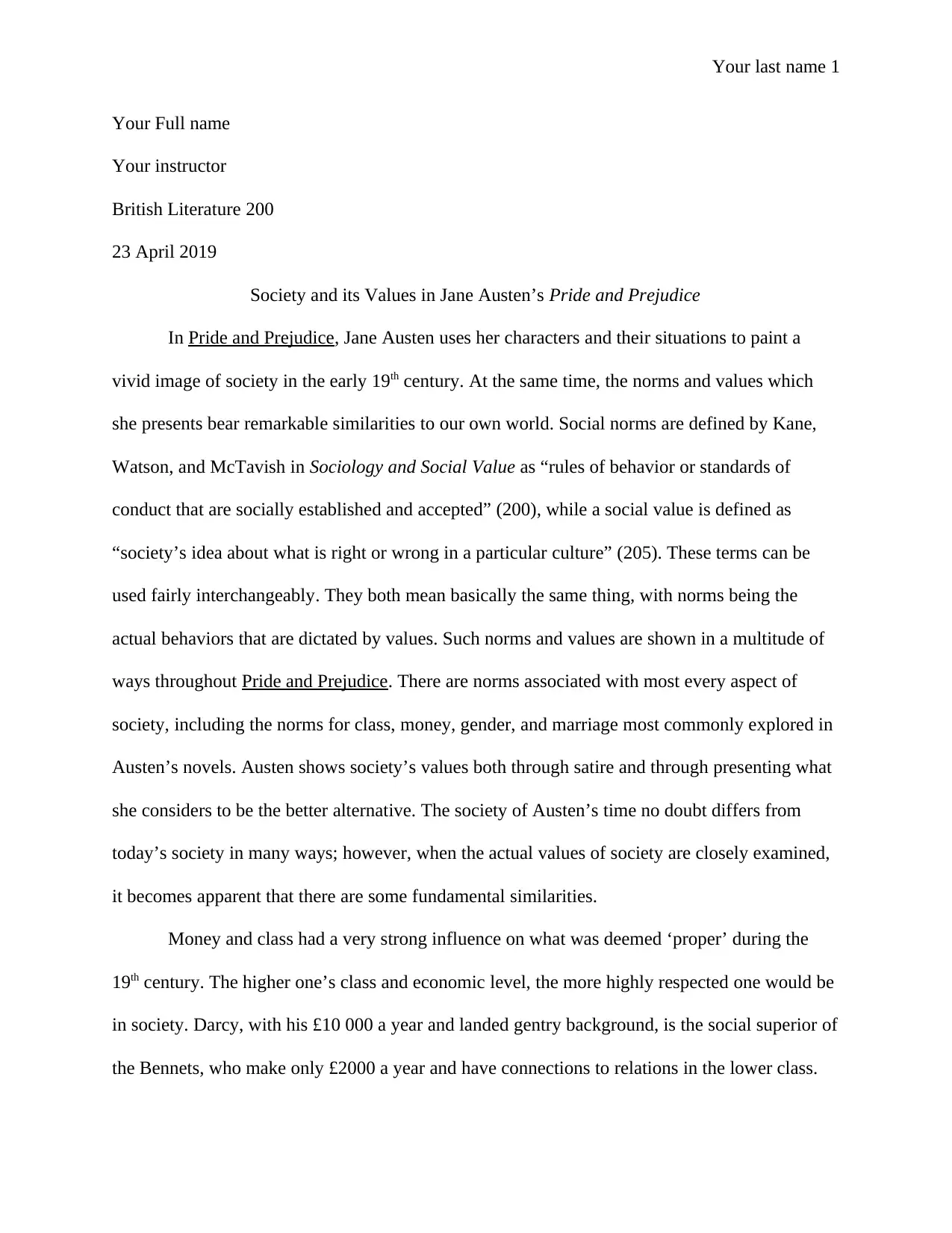
Your last name 1
Your Full name
Your instructor
British Literature 200
23 April 2019
Society and its Values in Jane Austen’s Pride and Prejudice
In Pride and Prejudice, Jane Austen uses her characters and their situations to paint a
vivid image of society in the early 19th century. At the same time, the norms and values which
she presents bear remarkable similarities to our own world. Social norms are defined by Kane,
Watson, and McTavish in Sociology and Social Value as “rules of behavior or standards of
conduct that are socially established and accepted” (200), while a social value is defined as
“society’s idea about what is right or wrong in a particular culture” (205). These terms can be
used fairly interchangeably. They both mean basically the same thing, with norms being the
actual behaviors that are dictated by values. Such norms and values are shown in a multitude of
ways throughout Pride and Prejudice. There are norms associated with most every aspect of
society, including the norms for class, money, gender, and marriage most commonly explored in
Austen’s novels. Austen shows society’s values both through satire and through presenting what
she considers to be the better alternative. The society of Austen’s time no doubt differs from
today’s society in many ways; however, when the actual values of society are closely examined,
it becomes apparent that there are some fundamental similarities.
Money and class had a very strong influence on what was deemed ‘proper’ during the
19th century. The higher one’s class and economic level, the more highly respected one would be
in society. Darcy, with his £10 000 a year and landed gentry background, is the social superior of
the Bennets, who make only £2000 a year and have connections to relations in the lower class.
Your Full name
Your instructor
British Literature 200
23 April 2019
Society and its Values in Jane Austen’s Pride and Prejudice
In Pride and Prejudice, Jane Austen uses her characters and their situations to paint a
vivid image of society in the early 19th century. At the same time, the norms and values which
she presents bear remarkable similarities to our own world. Social norms are defined by Kane,
Watson, and McTavish in Sociology and Social Value as “rules of behavior or standards of
conduct that are socially established and accepted” (200), while a social value is defined as
“society’s idea about what is right or wrong in a particular culture” (205). These terms can be
used fairly interchangeably. They both mean basically the same thing, with norms being the
actual behaviors that are dictated by values. Such norms and values are shown in a multitude of
ways throughout Pride and Prejudice. There are norms associated with most every aspect of
society, including the norms for class, money, gender, and marriage most commonly explored in
Austen’s novels. Austen shows society’s values both through satire and through presenting what
she considers to be the better alternative. The society of Austen’s time no doubt differs from
today’s society in many ways; however, when the actual values of society are closely examined,
it becomes apparent that there are some fundamental similarities.
Money and class had a very strong influence on what was deemed ‘proper’ during the
19th century. The higher one’s class and economic level, the more highly respected one would be
in society. Darcy, with his £10 000 a year and landed gentry background, is the social superior of
the Bennets, who make only £2000 a year and have connections to relations in the lower class.
Paraphrase This Document
Need a fresh take? Get an instant paraphrase of this document with our AI Paraphraser
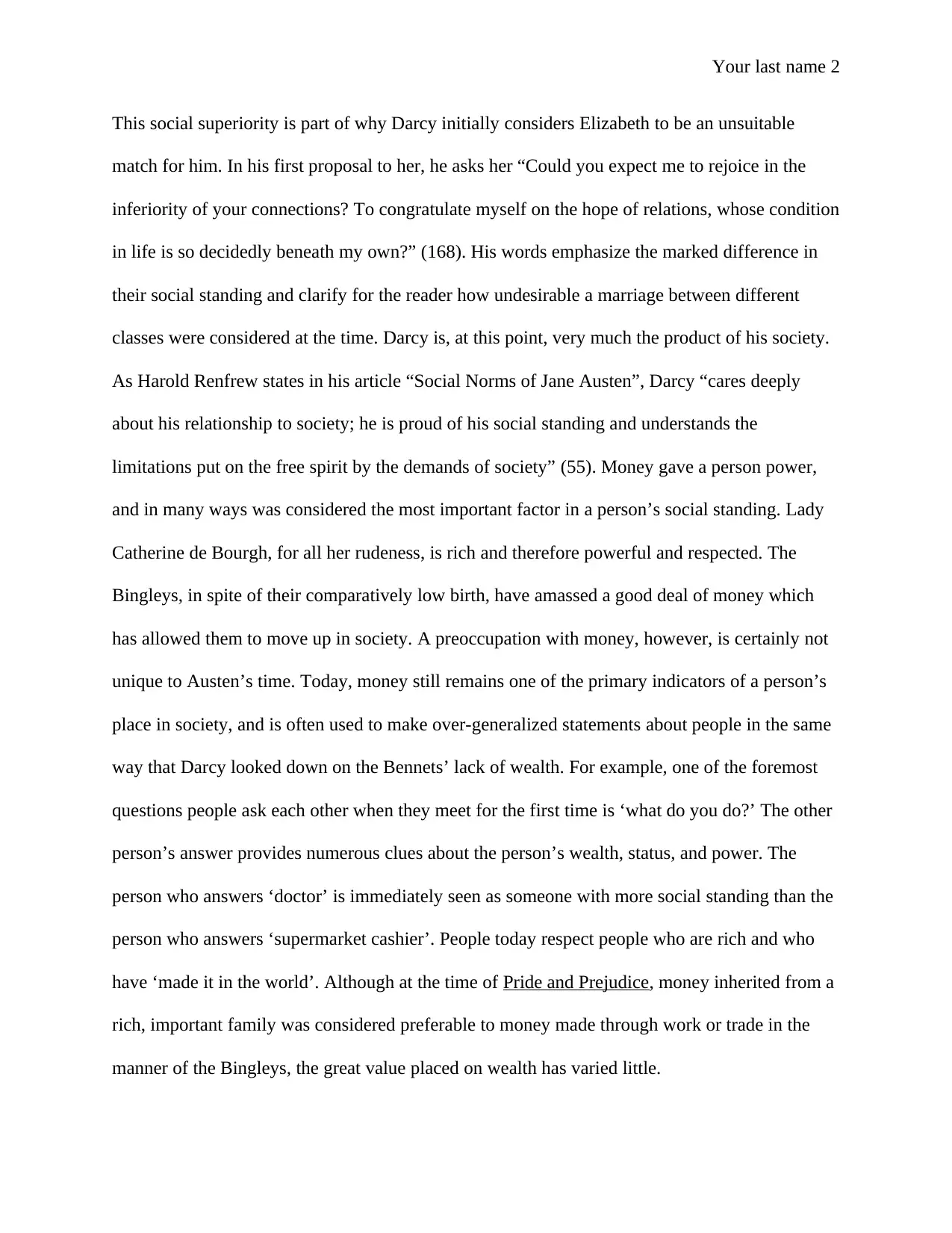
Your last name 2
This social superiority is part of why Darcy initially considers Elizabeth to be an unsuitable
match for him. In his first proposal to her, he asks her “Could you expect me to rejoice in the
inferiority of your connections? To congratulate myself on the hope of relations, whose condition
in life is so decidedly beneath my own?” (168). His words emphasize the marked difference in
their social standing and clarify for the reader how undesirable a marriage between different
classes were considered at the time. Darcy is, at this point, very much the product of his society.
As Harold Renfrew states in his article “Social Norms of Jane Austen”, Darcy “cares deeply
about his relationship to society; he is proud of his social standing and understands the
limitations put on the free spirit by the demands of society” (55). Money gave a person power,
and in many ways was considered the most important factor in a person’s social standing. Lady
Catherine de Bourgh, for all her rudeness, is rich and therefore powerful and respected. The
Bingleys, in spite of their comparatively low birth, have amassed a good deal of money which
has allowed them to move up in society. A preoccupation with money, however, is certainly not
unique to Austen’s time. Today, money still remains one of the primary indicators of a person’s
place in society, and is often used to make over-generalized statements about people in the same
way that Darcy looked down on the Bennets’ lack of wealth. For example, one of the foremost
questions people ask each other when they meet for the first time is ‘what do you do?’ The other
person’s answer provides numerous clues about the person’s wealth, status, and power. The
person who answers ‘doctor’ is immediately seen as someone with more social standing than the
person who answers ‘supermarket cashier’. People today respect people who are rich and who
have ‘made it in the world’. Although at the time of Pride and Prejudice, money inherited from a
rich, important family was considered preferable to money made through work or trade in the
manner of the Bingleys, the great value placed on wealth has varied little.
This social superiority is part of why Darcy initially considers Elizabeth to be an unsuitable
match for him. In his first proposal to her, he asks her “Could you expect me to rejoice in the
inferiority of your connections? To congratulate myself on the hope of relations, whose condition
in life is so decidedly beneath my own?” (168). His words emphasize the marked difference in
their social standing and clarify for the reader how undesirable a marriage between different
classes were considered at the time. Darcy is, at this point, very much the product of his society.
As Harold Renfrew states in his article “Social Norms of Jane Austen”, Darcy “cares deeply
about his relationship to society; he is proud of his social standing and understands the
limitations put on the free spirit by the demands of society” (55). Money gave a person power,
and in many ways was considered the most important factor in a person’s social standing. Lady
Catherine de Bourgh, for all her rudeness, is rich and therefore powerful and respected. The
Bingleys, in spite of their comparatively low birth, have amassed a good deal of money which
has allowed them to move up in society. A preoccupation with money, however, is certainly not
unique to Austen’s time. Today, money still remains one of the primary indicators of a person’s
place in society, and is often used to make over-generalized statements about people in the same
way that Darcy looked down on the Bennets’ lack of wealth. For example, one of the foremost
questions people ask each other when they meet for the first time is ‘what do you do?’ The other
person’s answer provides numerous clues about the person’s wealth, status, and power. The
person who answers ‘doctor’ is immediately seen as someone with more social standing than the
person who answers ‘supermarket cashier’. People today respect people who are rich and who
have ‘made it in the world’. Although at the time of Pride and Prejudice, money inherited from a
rich, important family was considered preferable to money made through work or trade in the
manner of the Bingleys, the great value placed on wealth has varied little.
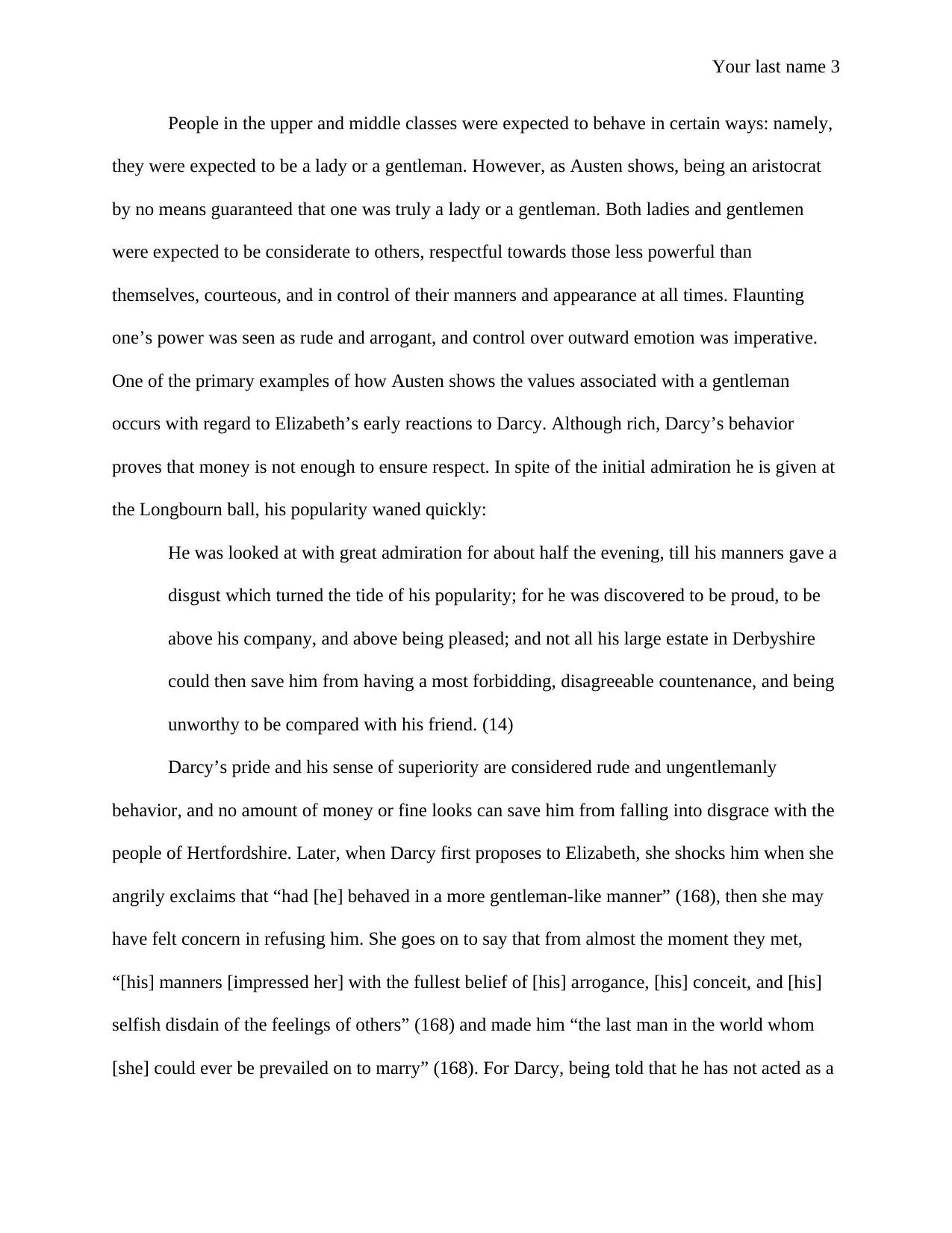
Your last name 3
People in the upper and middle classes were expected to behave in certain ways: namely,
they were expected to be a lady or a gentleman. However, as Austen shows, being an aristocrat
by no means guaranteed that one was truly a lady or a gentleman. Both ladies and gentlemen
were expected to be considerate to others, respectful towards those less powerful than
themselves, courteous, and in control of their manners and appearance at all times. Flaunting
one’s power was seen as rude and arrogant, and control over outward emotion was imperative.
One of the primary examples of how Austen shows the values associated with a gentleman
occurs with regard to Elizabeth’s early reactions to Darcy. Although rich, Darcy’s behavior
proves that money is not enough to ensure respect. In spite of the initial admiration he is given at
the Longbourn ball, his popularity waned quickly:
He was looked at with great admiration for about half the evening, till his manners gave a
disgust which turned the tide of his popularity; for he was discovered to be proud, to be
above his company, and above being pleased; and not all his large estate in Derbyshire
could then save him from having a most forbidding, disagreeable countenance, and being
unworthy to be compared with his friend. (14)
Darcy’s pride and his sense of superiority are considered rude and ungentlemanly
behavior, and no amount of money or fine looks can save him from falling into disgrace with the
people of Hertfordshire. Later, when Darcy first proposes to Elizabeth, she shocks him when she
angrily exclaims that “had [he] behaved in a more gentleman-like manner” (168), then she may
have felt concern in refusing him. She goes on to say that from almost the moment they met,
“[his] manners [impressed her] with the fullest belief of [his] arrogance, [his] conceit, and [his]
selfish disdain of the feelings of others” (168) and made him “the last man in the world whom
[she] could ever be prevailed on to marry” (168). For Darcy, being told that he has not acted as a
People in the upper and middle classes were expected to behave in certain ways: namely,
they were expected to be a lady or a gentleman. However, as Austen shows, being an aristocrat
by no means guaranteed that one was truly a lady or a gentleman. Both ladies and gentlemen
were expected to be considerate to others, respectful towards those less powerful than
themselves, courteous, and in control of their manners and appearance at all times. Flaunting
one’s power was seen as rude and arrogant, and control over outward emotion was imperative.
One of the primary examples of how Austen shows the values associated with a gentleman
occurs with regard to Elizabeth’s early reactions to Darcy. Although rich, Darcy’s behavior
proves that money is not enough to ensure respect. In spite of the initial admiration he is given at
the Longbourn ball, his popularity waned quickly:
He was looked at with great admiration for about half the evening, till his manners gave a
disgust which turned the tide of his popularity; for he was discovered to be proud, to be
above his company, and above being pleased; and not all his large estate in Derbyshire
could then save him from having a most forbidding, disagreeable countenance, and being
unworthy to be compared with his friend. (14)
Darcy’s pride and his sense of superiority are considered rude and ungentlemanly
behavior, and no amount of money or fine looks can save him from falling into disgrace with the
people of Hertfordshire. Later, when Darcy first proposes to Elizabeth, she shocks him when she
angrily exclaims that “had [he] behaved in a more gentleman-like manner” (168), then she may
have felt concern in refusing him. She goes on to say that from almost the moment they met,
“[his] manners [impressed her] with the fullest belief of [his] arrogance, [his] conceit, and [his]
selfish disdain of the feelings of others” (168) and made him “the last man in the world whom
[she] could ever be prevailed on to marry” (168). For Darcy, being told that he has not acted as a
⊘ This is a preview!⊘
Do you want full access?
Subscribe today to unlock all pages.

Trusted by 1+ million students worldwide
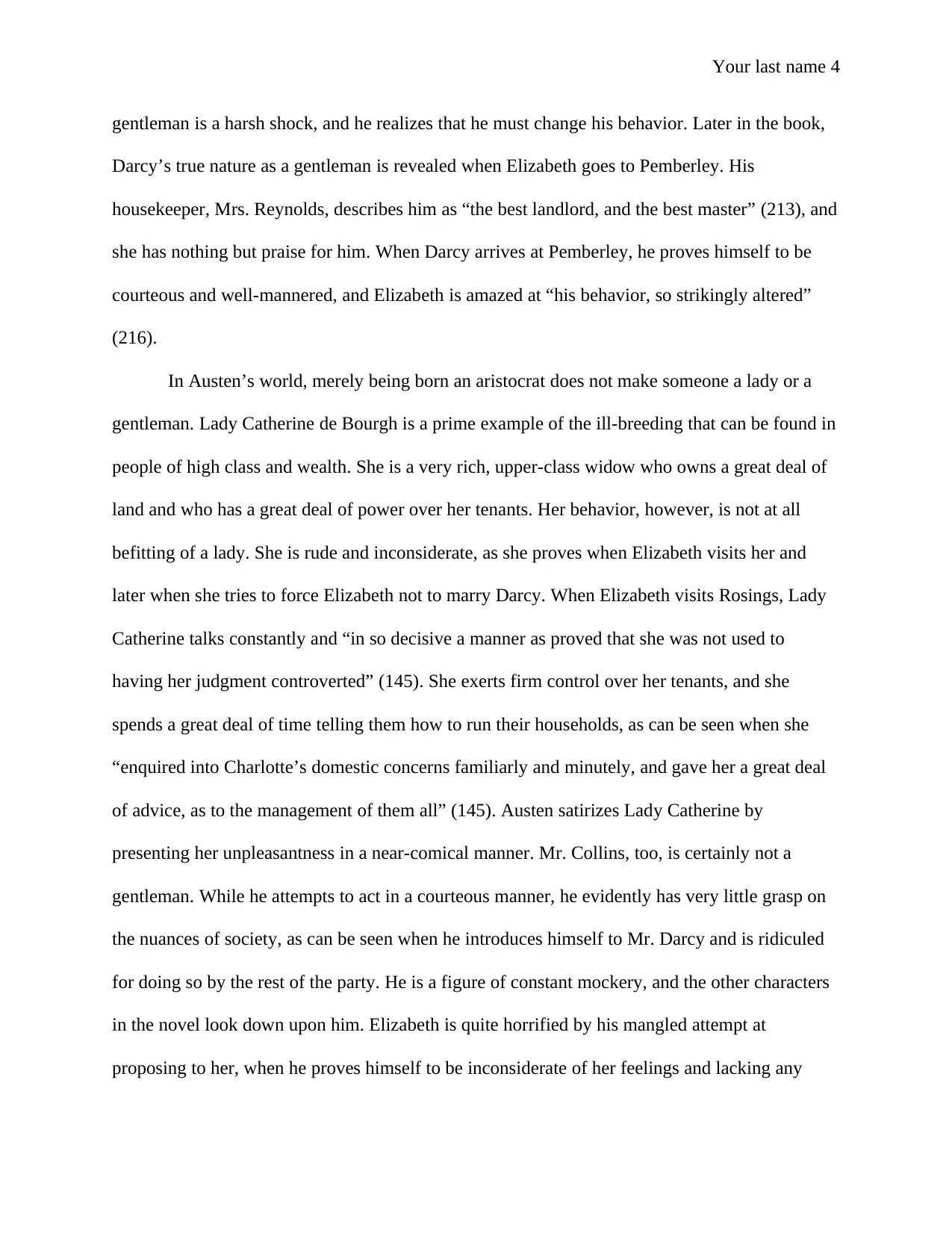
Your last name 4
gentleman is a harsh shock, and he realizes that he must change his behavior. Later in the book,
Darcy’s true nature as a gentleman is revealed when Elizabeth goes to Pemberley. His
housekeeper, Mrs. Reynolds, describes him as “the best landlord, and the best master” (213), and
she has nothing but praise for him. When Darcy arrives at Pemberley, he proves himself to be
courteous and well-mannered, and Elizabeth is amazed at “his behavior, so strikingly altered”
(216).
In Austen’s world, merely being born an aristocrat does not make someone a lady or a
gentleman. Lady Catherine de Bourgh is a prime example of the ill-breeding that can be found in
people of high class and wealth. She is a very rich, upper-class widow who owns a great deal of
land and who has a great deal of power over her tenants. Her behavior, however, is not at all
befitting of a lady. She is rude and inconsiderate, as she proves when Elizabeth visits her and
later when she tries to force Elizabeth not to marry Darcy. When Elizabeth visits Rosings, Lady
Catherine talks constantly and “in so decisive a manner as proved that she was not used to
having her judgment controverted” (145). She exerts firm control over her tenants, and she
spends a great deal of time telling them how to run their households, as can be seen when she
“enquired into Charlotte’s domestic concerns familiarly and minutely, and gave her a great deal
of advice, as to the management of them all” (145). Austen satirizes Lady Catherine by
presenting her unpleasantness in a near-comical manner. Mr. Collins, too, is certainly not a
gentleman. While he attempts to act in a courteous manner, he evidently has very little grasp on
the nuances of society, as can be seen when he introduces himself to Mr. Darcy and is ridiculed
for doing so by the rest of the party. He is a figure of constant mockery, and the other characters
in the novel look down upon him. Elizabeth is quite horrified by his mangled attempt at
proposing to her, when he proves himself to be inconsiderate of her feelings and lacking any
gentleman is a harsh shock, and he realizes that he must change his behavior. Later in the book,
Darcy’s true nature as a gentleman is revealed when Elizabeth goes to Pemberley. His
housekeeper, Mrs. Reynolds, describes him as “the best landlord, and the best master” (213), and
she has nothing but praise for him. When Darcy arrives at Pemberley, he proves himself to be
courteous and well-mannered, and Elizabeth is amazed at “his behavior, so strikingly altered”
(216).
In Austen’s world, merely being born an aristocrat does not make someone a lady or a
gentleman. Lady Catherine de Bourgh is a prime example of the ill-breeding that can be found in
people of high class and wealth. She is a very rich, upper-class widow who owns a great deal of
land and who has a great deal of power over her tenants. Her behavior, however, is not at all
befitting of a lady. She is rude and inconsiderate, as she proves when Elizabeth visits her and
later when she tries to force Elizabeth not to marry Darcy. When Elizabeth visits Rosings, Lady
Catherine talks constantly and “in so decisive a manner as proved that she was not used to
having her judgment controverted” (145). She exerts firm control over her tenants, and she
spends a great deal of time telling them how to run their households, as can be seen when she
“enquired into Charlotte’s domestic concerns familiarly and minutely, and gave her a great deal
of advice, as to the management of them all” (145). Austen satirizes Lady Catherine by
presenting her unpleasantness in a near-comical manner. Mr. Collins, too, is certainly not a
gentleman. While he attempts to act in a courteous manner, he evidently has very little grasp on
the nuances of society, as can be seen when he introduces himself to Mr. Darcy and is ridiculed
for doing so by the rest of the party. He is a figure of constant mockery, and the other characters
in the novel look down upon him. Elizabeth is quite horrified by his mangled attempt at
proposing to her, when he proves himself to be inconsiderate of her feelings and lacking any
Paraphrase This Document
Need a fresh take? Get an instant paraphrase of this document with our AI Paraphraser
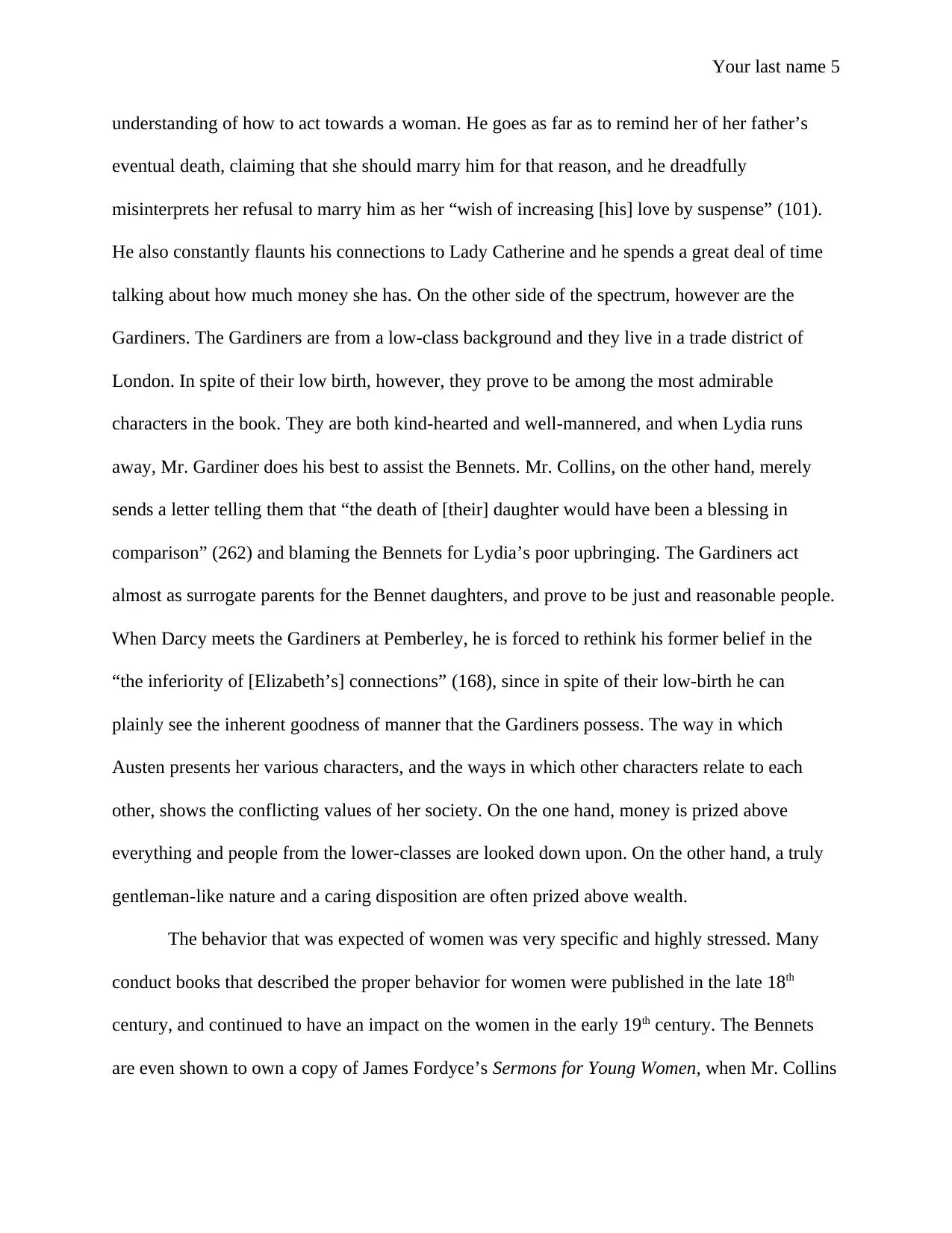
Your last name 5
understanding of how to act towards a woman. He goes as far as to remind her of her father’s
eventual death, claiming that she should marry him for that reason, and he dreadfully
misinterprets her refusal to marry him as her “wish of increasing [his] love by suspense” (101).
He also constantly flaunts his connections to Lady Catherine and he spends a great deal of time
talking about how much money she has. On the other side of the spectrum, however are the
Gardiners. The Gardiners are from a low-class background and they live in a trade district of
London. In spite of their low birth, however, they prove to be among the most admirable
characters in the book. They are both kind-hearted and well-mannered, and when Lydia runs
away, Mr. Gardiner does his best to assist the Bennets. Mr. Collins, on the other hand, merely
sends a letter telling them that “the death of [their] daughter would have been a blessing in
comparison” (262) and blaming the Bennets for Lydia’s poor upbringing. The Gardiners act
almost as surrogate parents for the Bennet daughters, and prove to be just and reasonable people.
When Darcy meets the Gardiners at Pemberley, he is forced to rethink his former belief in the
“the inferiority of [Elizabeth’s] connections” (168), since in spite of their low-birth he can
plainly see the inherent goodness of manner that the Gardiners possess. The way in which
Austen presents her various characters, and the ways in which other characters relate to each
other, shows the conflicting values of her society. On the one hand, money is prized above
everything and people from the lower-classes are looked down upon. On the other hand, a truly
gentleman-like nature and a caring disposition are often prized above wealth.
The behavior that was expected of women was very specific and highly stressed. Many
conduct books that described the proper behavior for women were published in the late 18th
century, and continued to have an impact on the women in the early 19th century. The Bennets
are even shown to own a copy of James Fordyce’s Sermons for Young Women, when Mr. Collins
understanding of how to act towards a woman. He goes as far as to remind her of her father’s
eventual death, claiming that she should marry him for that reason, and he dreadfully
misinterprets her refusal to marry him as her “wish of increasing [his] love by suspense” (101).
He also constantly flaunts his connections to Lady Catherine and he spends a great deal of time
talking about how much money she has. On the other side of the spectrum, however are the
Gardiners. The Gardiners are from a low-class background and they live in a trade district of
London. In spite of their low birth, however, they prove to be among the most admirable
characters in the book. They are both kind-hearted and well-mannered, and when Lydia runs
away, Mr. Gardiner does his best to assist the Bennets. Mr. Collins, on the other hand, merely
sends a letter telling them that “the death of [their] daughter would have been a blessing in
comparison” (262) and blaming the Bennets for Lydia’s poor upbringing. The Gardiners act
almost as surrogate parents for the Bennet daughters, and prove to be just and reasonable people.
When Darcy meets the Gardiners at Pemberley, he is forced to rethink his former belief in the
“the inferiority of [Elizabeth’s] connections” (168), since in spite of their low-birth he can
plainly see the inherent goodness of manner that the Gardiners possess. The way in which
Austen presents her various characters, and the ways in which other characters relate to each
other, shows the conflicting values of her society. On the one hand, money is prized above
everything and people from the lower-classes are looked down upon. On the other hand, a truly
gentleman-like nature and a caring disposition are often prized above wealth.
The behavior that was expected of women was very specific and highly stressed. Many
conduct books that described the proper behavior for women were published in the late 18th
century, and continued to have an impact on the women in the early 19th century. The Bennets
are even shown to own a copy of James Fordyce’s Sermons for Young Women, when Mr. Collins
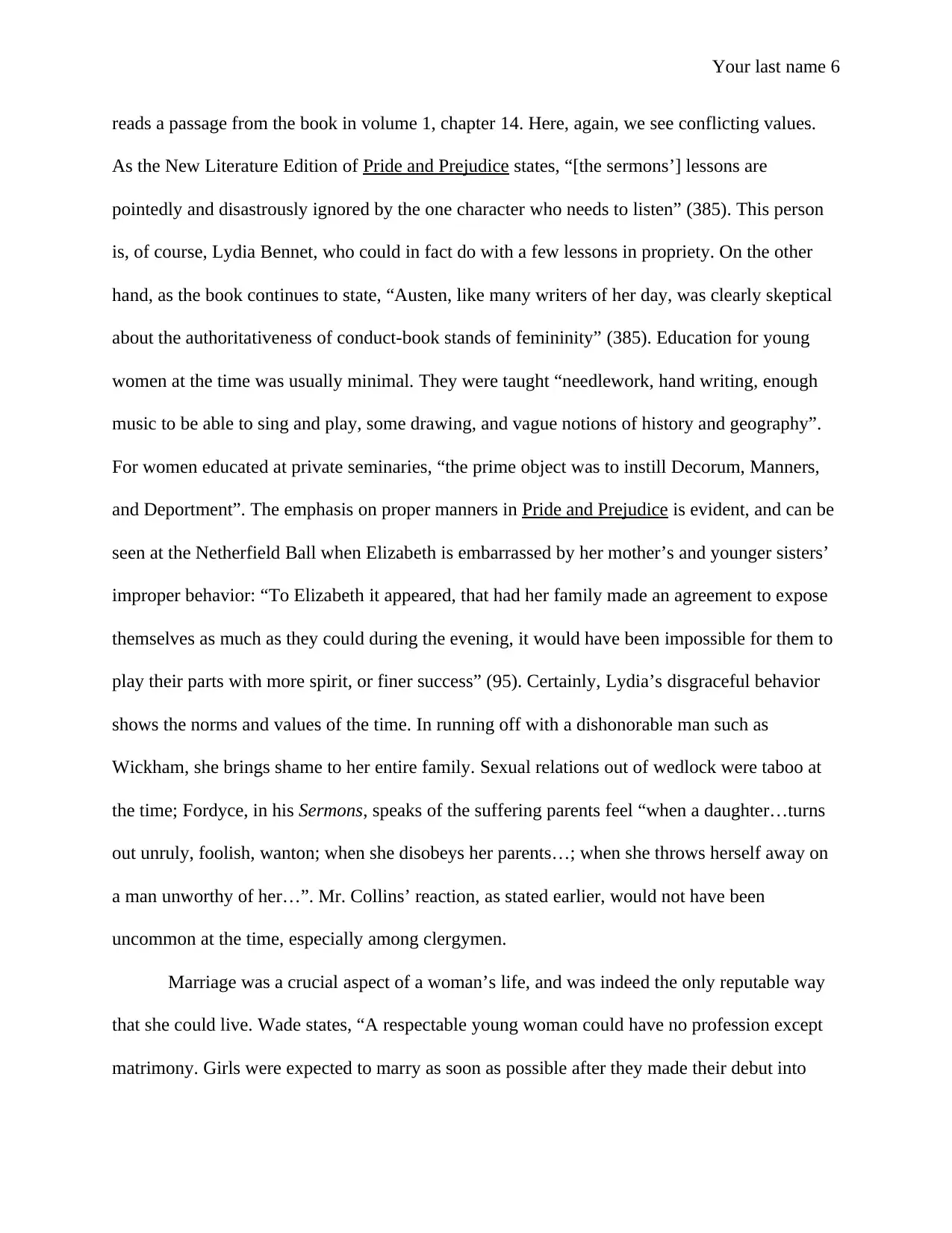
Your last name 6
reads a passage from the book in volume 1, chapter 14. Here, again, we see conflicting values.
As the New Literature Edition of Pride and Prejudice states, “[the sermons’] lessons are
pointedly and disastrously ignored by the one character who needs to listen” (385). This person
is, of course, Lydia Bennet, who could in fact do with a few lessons in propriety. On the other
hand, as the book continues to state, “Austen, like many writers of her day, was clearly skeptical
about the authoritativeness of conduct-book stands of femininity” (385). Education for young
women at the time was usually minimal. They were taught “needlework, hand writing, enough
music to be able to sing and play, some drawing, and vague notions of history and geography”.
For women educated at private seminaries, “the prime object was to instill Decorum, Manners,
and Deportment”. The emphasis on proper manners in Pride and Prejudice is evident, and can be
seen at the Netherfield Ball when Elizabeth is embarrassed by her mother’s and younger sisters’
improper behavior: “To Elizabeth it appeared, that had her family made an agreement to expose
themselves as much as they could during the evening, it would have been impossible for them to
play their parts with more spirit, or finer success” (95). Certainly, Lydia’s disgraceful behavior
shows the norms and values of the time. In running off with a dishonorable man such as
Wickham, she brings shame to her entire family. Sexual relations out of wedlock were taboo at
the time; Fordyce, in his Sermons, speaks of the suffering parents feel “when a daughter…turns
out unruly, foolish, wanton; when she disobeys her parents…; when she throws herself away on
a man unworthy of her…”. Mr. Collins’ reaction, as stated earlier, would not have been
uncommon at the time, especially among clergymen.
Marriage was a crucial aspect of a woman’s life, and was indeed the only reputable way
that she could live. Wade states, “A respectable young woman could have no profession except
matrimony. Girls were expected to marry as soon as possible after they made their debut into
reads a passage from the book in volume 1, chapter 14. Here, again, we see conflicting values.
As the New Literature Edition of Pride and Prejudice states, “[the sermons’] lessons are
pointedly and disastrously ignored by the one character who needs to listen” (385). This person
is, of course, Lydia Bennet, who could in fact do with a few lessons in propriety. On the other
hand, as the book continues to state, “Austen, like many writers of her day, was clearly skeptical
about the authoritativeness of conduct-book stands of femininity” (385). Education for young
women at the time was usually minimal. They were taught “needlework, hand writing, enough
music to be able to sing and play, some drawing, and vague notions of history and geography”.
For women educated at private seminaries, “the prime object was to instill Decorum, Manners,
and Deportment”. The emphasis on proper manners in Pride and Prejudice is evident, and can be
seen at the Netherfield Ball when Elizabeth is embarrassed by her mother’s and younger sisters’
improper behavior: “To Elizabeth it appeared, that had her family made an agreement to expose
themselves as much as they could during the evening, it would have been impossible for them to
play their parts with more spirit, or finer success” (95). Certainly, Lydia’s disgraceful behavior
shows the norms and values of the time. In running off with a dishonorable man such as
Wickham, she brings shame to her entire family. Sexual relations out of wedlock were taboo at
the time; Fordyce, in his Sermons, speaks of the suffering parents feel “when a daughter…turns
out unruly, foolish, wanton; when she disobeys her parents…; when she throws herself away on
a man unworthy of her…”. Mr. Collins’ reaction, as stated earlier, would not have been
uncommon at the time, especially among clergymen.
Marriage was a crucial aspect of a woman’s life, and was indeed the only reputable way
that she could live. Wade states, “A respectable young woman could have no profession except
matrimony. Girls were expected to marry as soon as possible after they made their debut into
⊘ This is a preview!⊘
Do you want full access?
Subscribe today to unlock all pages.

Trusted by 1+ million students worldwide
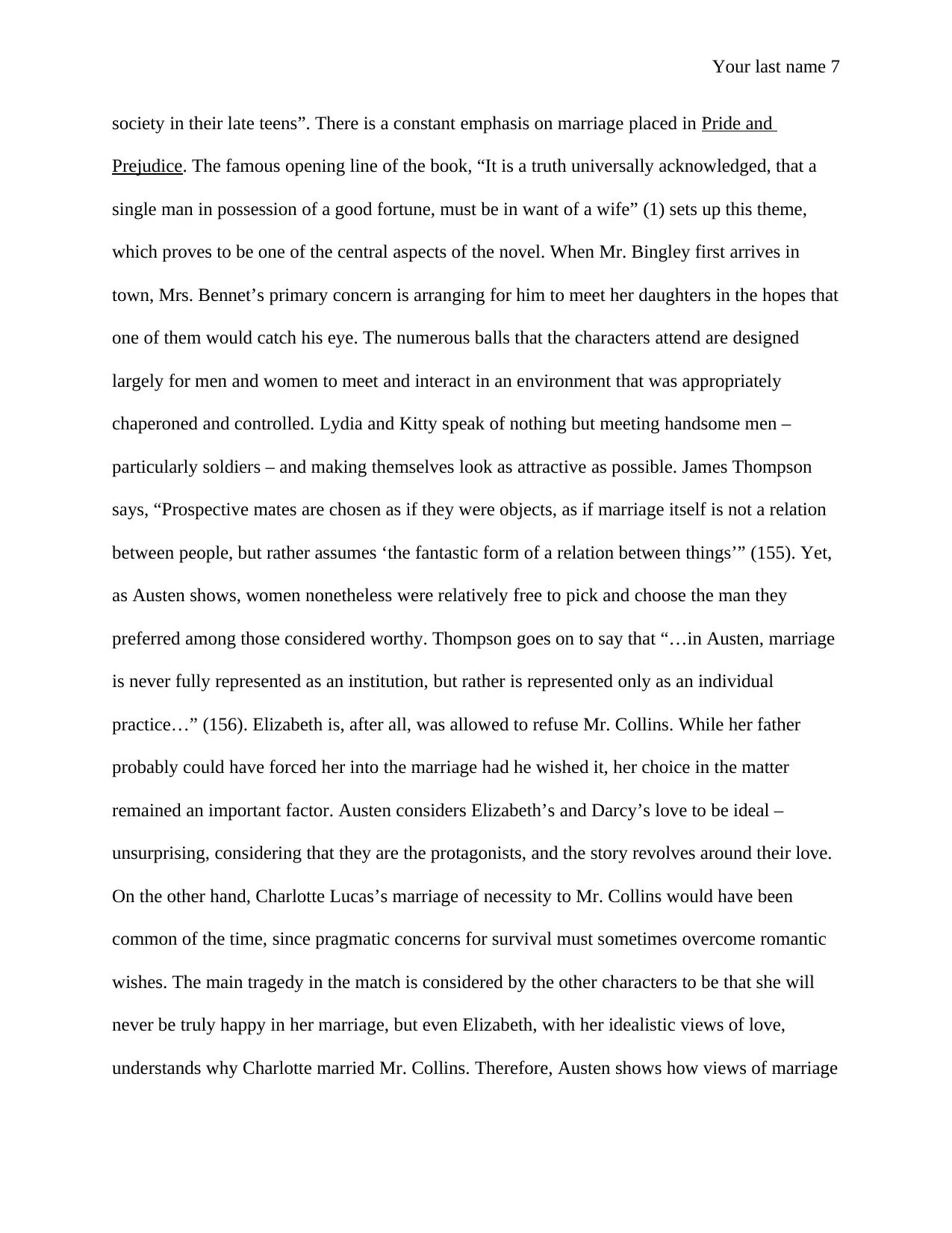
Your last name 7
society in their late teens”. There is a constant emphasis on marriage placed in Pride and
Prejudice. The famous opening line of the book, “It is a truth universally acknowledged, that a
single man in possession of a good fortune, must be in want of a wife” (1) sets up this theme,
which proves to be one of the central aspects of the novel. When Mr. Bingley first arrives in
town, Mrs. Bennet’s primary concern is arranging for him to meet her daughters in the hopes that
one of them would catch his eye. The numerous balls that the characters attend are designed
largely for men and women to meet and interact in an environment that was appropriately
chaperoned and controlled. Lydia and Kitty speak of nothing but meeting handsome men –
particularly soldiers – and making themselves look as attractive as possible. James Thompson
says, “Prospective mates are chosen as if they were objects, as if marriage itself is not a relation
between people, but rather assumes ‘the fantastic form of a relation between things’” (155). Yet,
as Austen shows, women nonetheless were relatively free to pick and choose the man they
preferred among those considered worthy. Thompson goes on to say that “…in Austen, marriage
is never fully represented as an institution, but rather is represented only as an individual
practice…” (156). Elizabeth is, after all, was allowed to refuse Mr. Collins. While her father
probably could have forced her into the marriage had he wished it, her choice in the matter
remained an important factor. Austen considers Elizabeth’s and Darcy’s love to be ideal –
unsurprising, considering that they are the protagonists, and the story revolves around their love.
On the other hand, Charlotte Lucas’s marriage of necessity to Mr. Collins would have been
common of the time, since pragmatic concerns for survival must sometimes overcome romantic
wishes. The main tragedy in the match is considered by the other characters to be that she will
never be truly happy in her marriage, but even Elizabeth, with her idealistic views of love,
understands why Charlotte married Mr. Collins. Therefore, Austen shows how views of marriage
society in their late teens”. There is a constant emphasis on marriage placed in Pride and
Prejudice. The famous opening line of the book, “It is a truth universally acknowledged, that a
single man in possession of a good fortune, must be in want of a wife” (1) sets up this theme,
which proves to be one of the central aspects of the novel. When Mr. Bingley first arrives in
town, Mrs. Bennet’s primary concern is arranging for him to meet her daughters in the hopes that
one of them would catch his eye. The numerous balls that the characters attend are designed
largely for men and women to meet and interact in an environment that was appropriately
chaperoned and controlled. Lydia and Kitty speak of nothing but meeting handsome men –
particularly soldiers – and making themselves look as attractive as possible. James Thompson
says, “Prospective mates are chosen as if they were objects, as if marriage itself is not a relation
between people, but rather assumes ‘the fantastic form of a relation between things’” (155). Yet,
as Austen shows, women nonetheless were relatively free to pick and choose the man they
preferred among those considered worthy. Thompson goes on to say that “…in Austen, marriage
is never fully represented as an institution, but rather is represented only as an individual
practice…” (156). Elizabeth is, after all, was allowed to refuse Mr. Collins. While her father
probably could have forced her into the marriage had he wished it, her choice in the matter
remained an important factor. Austen considers Elizabeth’s and Darcy’s love to be ideal –
unsurprising, considering that they are the protagonists, and the story revolves around their love.
On the other hand, Charlotte Lucas’s marriage of necessity to Mr. Collins would have been
common of the time, since pragmatic concerns for survival must sometimes overcome romantic
wishes. The main tragedy in the match is considered by the other characters to be that she will
never be truly happy in her marriage, but even Elizabeth, with her idealistic views of love,
understands why Charlotte married Mr. Collins. Therefore, Austen shows how views of marriage
Paraphrase This Document
Need a fresh take? Get an instant paraphrase of this document with our AI Paraphraser
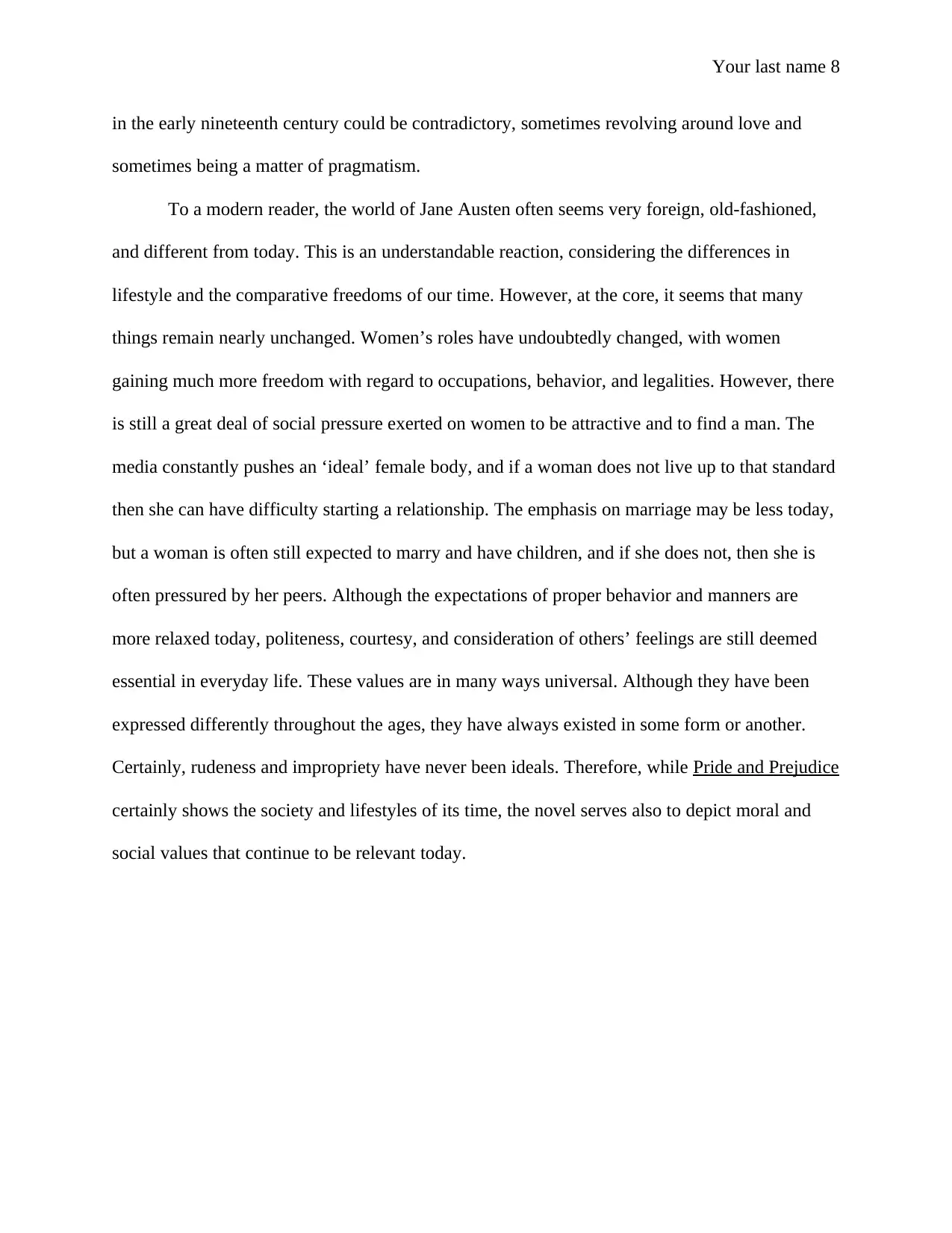
Your last name 8
in the early nineteenth century could be contradictory, sometimes revolving around love and
sometimes being a matter of pragmatism.
To a modern reader, the world of Jane Austen often seems very foreign, old-fashioned,
and different from today. This is an understandable reaction, considering the differences in
lifestyle and the comparative freedoms of our time. However, at the core, it seems that many
things remain nearly unchanged. Women’s roles have undoubtedly changed, with women
gaining much more freedom with regard to occupations, behavior, and legalities. However, there
is still a great deal of social pressure exerted on women to be attractive and to find a man. The
media constantly pushes an ‘ideal’ female body, and if a woman does not live up to that standard
then she can have difficulty starting a relationship. The emphasis on marriage may be less today,
but a woman is often still expected to marry and have children, and if she does not, then she is
often pressured by her peers. Although the expectations of proper behavior and manners are
more relaxed today, politeness, courtesy, and consideration of others’ feelings are still deemed
essential in everyday life. These values are in many ways universal. Although they have been
expressed differently throughout the ages, they have always existed in some form or another.
Certainly, rudeness and impropriety have never been ideals. Therefore, while Pride and Prejudice
certainly shows the society and lifestyles of its time, the novel serves also to depict moral and
social values that continue to be relevant today.
in the early nineteenth century could be contradictory, sometimes revolving around love and
sometimes being a matter of pragmatism.
To a modern reader, the world of Jane Austen often seems very foreign, old-fashioned,
and different from today. This is an understandable reaction, considering the differences in
lifestyle and the comparative freedoms of our time. However, at the core, it seems that many
things remain nearly unchanged. Women’s roles have undoubtedly changed, with women
gaining much more freedom with regard to occupations, behavior, and legalities. However, there
is still a great deal of social pressure exerted on women to be attractive and to find a man. The
media constantly pushes an ‘ideal’ female body, and if a woman does not live up to that standard
then she can have difficulty starting a relationship. The emphasis on marriage may be less today,
but a woman is often still expected to marry and have children, and if she does not, then she is
often pressured by her peers. Although the expectations of proper behavior and manners are
more relaxed today, politeness, courtesy, and consideration of others’ feelings are still deemed
essential in everyday life. These values are in many ways universal. Although they have been
expressed differently throughout the ages, they have always existed in some form or another.
Certainly, rudeness and impropriety have never been ideals. Therefore, while Pride and Prejudice
certainly shows the society and lifestyles of its time, the novel serves also to depict moral and
social values that continue to be relevant today.
1 out of 8
Related Documents
Your All-in-One AI-Powered Toolkit for Academic Success.
+13062052269
info@desklib.com
Available 24*7 on WhatsApp / Email
![[object Object]](/_next/static/media/star-bottom.7253800d.svg)
Unlock your academic potential
Copyright © 2020–2026 A2Z Services. All Rights Reserved. Developed and managed by ZUCOL.





